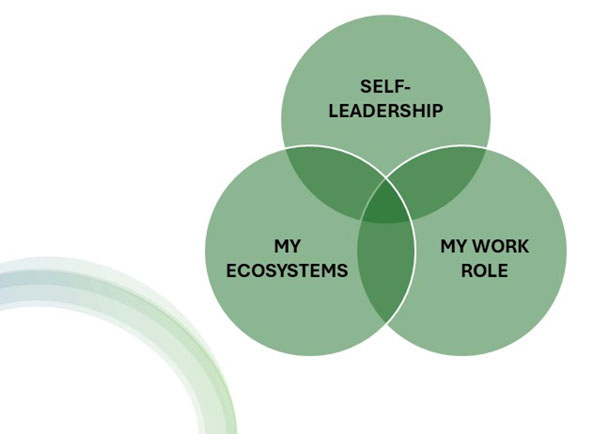We use developmental rather than conventional performance coaching to create deep transformational improvements within you
Our 3 Domains Model
The foundation of our coaching approach is an integrated 3 Domains Model that creates a holistic system of your world and reflects the interconnectedness of these different domains.

Self-Leadership (Being)
- Understanding my identity (complexity of who I am)
- Dealing with obstacles to growth (self – awareness, contextual awareness, stress, confidence)
My Work Role (Doing)
- Integration of multiple roles I play in different contexts and stakeholders
- How my role adds value
- How well aligned I am with my work
My Ecosystems (Impacting)
- Leading my organization through change and transformation
- Interaction of my organization with industry and society
When working with you, we use a dialectical approach to help you think holistically and systemically, resolve tensions between conflicting ideas and perspectives, and find innovative solutions to the most pressing issues you are confronted with.
We help you understand alignments and misalignments between you, your work teams, and your organizational environment. By helping you understand the interaction between these domains, you can plan how to create synergies which then lead to superior performance and personal growth.
What You Can Expect As Outcomes
- Improved sense-making of situations, leading to better decision-making
- Increased effectiveness in navigating complexity and ambiguity
- Maximize your growth potential
- Reconcile your personal and professional worlds, with their competing demands
- Greater confidence and positive impact in your leadership role
- Improved relationships with stakeholders – team, peers, senior leaders, and customers
While our coaching and consulting services are highly personalized, we draw your attention to emerging leadership topics
We observe several leadership trends that shape the way organizations operate and how leaders engage with their teams and stakeholders. Key emerging leadership trends include:
SELF-LEADERSHIP
Continuous Learning and Development: Leaders must continuously update their skills and knowledge to stay relevant and effective.
LEADERSHIP OF OTHERS
Empathy, Emotional Intelligence, and Wisdom: It is no longer enough to be smart. Understanding and relating to the emotions of others is crucial for building strong teams and stakeholder relationships and fostering a positive work environment.
Adaptive Leadership: Leaders need to guide others through change and uncertainty using a deeper appreciation of the psychosocial factors. The need for change challenges our cognitive and emotional capabilities. Leaders need to support by creating a climate for risk-taking and collaborative problem-solving.
Resilience and Psychological Flexibility: What it takes to be a future-ready, courageous leader.
Collaborative Leadership: Leaders are now facilitators who empower their teams to contribute and take ownership of their work.
CULTURE
Focus on Inclusivity and Diversity: There is a growing trend towards creating more inclusive and diverse workplaces, given the evidence available of the positive impact on organizational performance. Leaders need to ensure that all voices are heard and valued, which can lead to more innovative and effective solutions.
Remote and Flexible Work: The rise of remote work has changed the landscape of leadership. Leaders must find new ways to connect with and lead remote teams, which requires a different set of skills and tools.
CHANGE AND INNOVATION
Cognitive Agility: In an increasingly dynamic environment, the ability to pivot when faced with new variables and tackle immunity to change is essential.
Adaptive Thinking: Continuous innovation requires diverse thinking strategies to remain competitive in the face of future challenges, questioning norms.
Technology Integration: Leaders must be comfortable with technology and understand how to leverage it to improve productivity, communication, and decision-making within their organizations. They need to embrace the opportunities and disruptions of generative AI.
ORGANIZATIONAL RELATIONSHIP WITH ENVIRONMENT
Sustainability and Social Responsibility: There is an increasing expectation for leaders to consider the social and environmental impact of their business decisions. Sustainable practices and corporate social responsibility are becoming integral to a company’s success and reputation.
